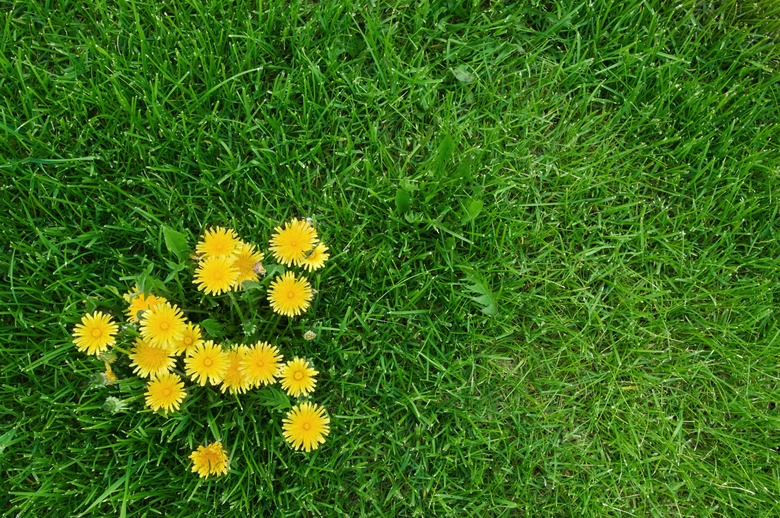The Difference Between Flowers & Weeds
The difference between flowers and weeds is a matter of perception. The definition of a weed is a plant that is growing in a place in which it not desired, and this can mean different things to different people.
A homeowner may curse the dandelions and clover in their lawn, while their neighbor may enjoy the color and edible sustenance the plants add to theirs. To a farmer growing corn, wildflowers are weeds, but a dairy farm may want as many flowers and herbs as possible in theirs to create a diverse pasture. A gardener may grow ornamental flowers in a home garden, but in national parks and nature reserves that flower could be a weed, and many parks struggle to control plants that have escaped gardens and outcompete the native vegetation.
Characteristics of a Weed
Characteristics of a Weed
In general, a plant can said to be "weedy" if it shows characteristics that help it to increase rapidly in size, number and distribution. These factors include rapid growth, producing large quantities of seed (which are often easily transported by wind, animals and other forces) and being able to grow in a wide variety of habitats.
Negative Impacts From Weeds
Negative Impacts From Weeds
Many plants may not be weeds in their native habitat but become weeds when transported into a different environment. A water fern called salvinia has spread from its native regions in Brazil and Argentina to warm freshwater locations all around the world, where it forms dense mats that choke out native animals and plants, prevents light from entering waterways and lowers oxygen levels to the detriment of other species.
Another plant, a vine called kudzu, grows extremely rapidly and is known to grow over whole fields, trees and buildings, smothering all other plants underneath.
Weeds can also significantly impact agricultural production by competing with crops for light, space, water and nutrients, containing compounds that are poisonous to livestock or by hosting pests and diseases.
Uses of Weeds
Uses of Weeds
Many plants that are considered weeds in gardening or agricultural situations may have a variety of beneficial properties. Thistles are often considered a significant problem in fields and crops. However, thistles often grow in poor, damaged soils, and the deep taproots increase water infiltration and draw minerals from the soil to the surface – processes that help repair the soil. Their flowers are also very attractive to bees, butterflies and other insects, and thistle-based remedies can assist with liver function, reduce cholesterol and promote skin health.
Many weeds, such as St. Johns wort and yarrow, are said to have various medicinal properties. Some of these, including dandelion, nettle and purslane, are also a delicious addition to salads, soups and other dishes.
Most weeds also produce flowers that are not only beautiful to look at but also provide pollen, nectar and seeds for a wide variety of insects, birds and other creatures. A example is the monarch butterfly, a spectacular species that travels in the millions each year in the world's largest insect migration. Unfortunately, due to the eradication of the milkweed plant in agricultural areas (on which the monarch lays its eggs for its caterpillars to eat), the number of monarch butterflies has declined drastically, and it is now in danger of extinction.
How to Control Weeds
How to Control Weeds
Weeds are often controlled with the use of herbicides, but this can affect other plants and organisms in the environment. Other methods of control include fire, manually removing the plants, putting down mulch or growing a cover crop to smother weeds.
Biological controls such as goats, leaf-eating insects or disease-causing fungi can be used to target weeds. In natural areas, the dominance of weeds often indicates an imbalance or disturbance in the environment. Diverse and healthy ecosystems are far less susceptible to weeds than ones that are in poor health.
References
- The Guardian: Western Monarch Butterflies Are Nearly Extinct. California Has a Plan to Save Them
- University of Florida: Center for Aquatic and Invasive Plants: Salvinia Molesta
- University of Florida: Center for Aquatic and Invasive Plants: Pueraria Montana
- eOrganic: An Ecological Understanding of Weeds
Cite This Article
MLA
Michelle, Meg. "The Difference Between Flowers & Weeds" sciencing.com, https://www.sciencing.com/the-difference-between-flowers-weeds-13428135/. 30 September 2021.
APA
Michelle, Meg. (2021, September 30). The Difference Between Flowers & Weeds. sciencing.com. Retrieved from https://www.sciencing.com/the-difference-between-flowers-weeds-13428135/
Chicago
Michelle, Meg. The Difference Between Flowers & Weeds last modified March 24, 2022. https://www.sciencing.com/the-difference-between-flowers-weeds-13428135/
